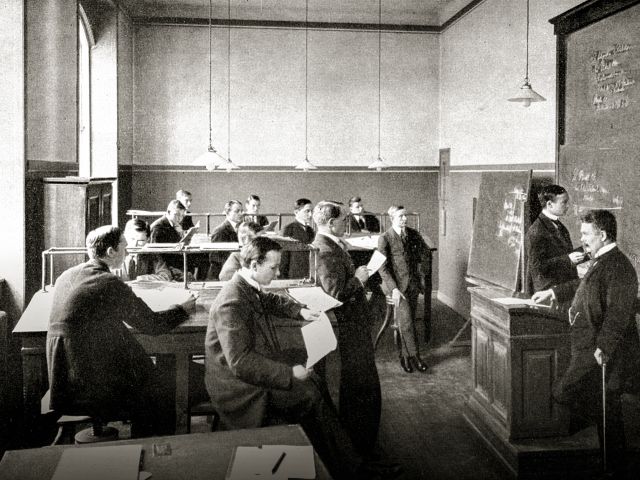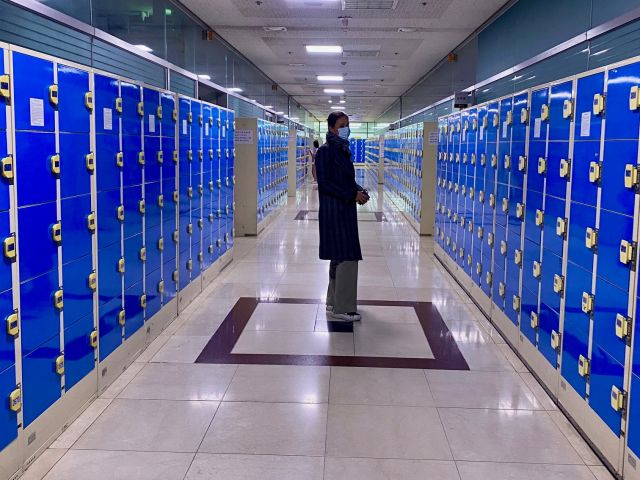Mads Mordhorst: In a matter of hours I was the most hated man in the country

Mads Mordhorst, Associate Professor at the Department of Management, Politics and Philosophy, now speaks up about the media storm about the Danish song. (Photo: Private)
Two years after the media storm about “The Danish Song is a young, blond girl”, Mads Mordhorst, Associate Professor and the center of attention, tells his version of what happened back then, and why he has not broken his silence earlier and put the case to rest.
Every two months or so since January 2019, I have reached out to Mads Mordhorst with one question: “Do you want to talk about what happened back in December 2018?”
“What happened” refers to one of the biggest identity political cases we have had in Denmark. The case about the song entitled “The Danish song is a young, blond girl” and whether it was appropriate to sing it at CBS or not, and whether or not Mads Mordhorst, Associate Professor and, at the time, deputy head of department, had apologized for singing it, after a colleague questioned the content of the song and the context in which it was being sung at a meeting back in 2016.
The case, which was published by the Danish newspaper Kristeligt Dagblad on December 19, 2018, had both the former and current prime ministers Lars Løkke Rasmussen and Mette Frederiksen commenting on it in public. Almost every Dane had an opinion about it. But the main character remained silent except for uploading a short Facebook post published on the same date as the Kristeligt Dagblad article.
So since then, I have asked whether Mads Mordhorst wanted to tell his side of things. Again and again I was asked to wait for a while. Then a little longer. A couple of months more. Until almost two years had passed. However, now is a good time, according to Mads Mordhorst from the Department of Management, Politics and Philosophy and leader of the Center for Business History at CBS.
“What shocked me back then, and actually hasn’t shocked me any less since, was the enormous surge of unleashed emotions,” he says when asked what first comes to mind when thinking back to the time around December 19.
“The hate people had for me, and people feeling deeply offended about this case, surprised me. And it hasn’t surprised me any less since. In just a few hours, I became the most hated man in the country and was on the front page of all the media and the center of attention in the Danish parliament. But first and foremost, I was shocked about why they hated me.”
“I have never, as the matter has been presented, apologized for the song being sung”
Before we go into why Mads Mordhorst has not spoken publicly about the case over the past two years and presented his version of the sequence of events earlier on, we need his version.
On December 5, 2020, Mads Mordhorst had a feature article published in the Danish newspaper Berlingske – “The case of the song that became an identity-politics evergreen”.
In this feature article, Mads Mordhorst writes that at one of the department’s monthly brunch meetings in 2016, the team responsible for arranging the meeting had hit on the idea of a sing-along. They had chosen “The Danish song is a young, blonde girl”.
At the time in 2016 when the meeting took place, the refugee crisis was still very much a hot topic being discussed in media, by politicians and over the dining table. After the song had been sung, a young, “brown” researcher explained that “she had experienced increasing racism and, on that basis, she questioned describing ‘Danishness’ as young and blond. A question that is legitimate in an academic environment that thrives on critical discussion and analyses,” Mads Mordhorst writes.
According to the feature article, this prompted a discussion among the staff members, and some of them used “unnecessarily hard” expressions and rejected her comments.
“I had the impression that she was left feeling shocked after the meeting. That being the case, I spoke to her afterwards in my capacity as her immediate leader. During our conversation, she never brought up the subject of feeling offended by the song itself or requiring an apology. She was frustrated by the reaction to her comments. I apologized to her for the tone some of my colleagues had used during the discussion. This was a personal expression of regret from a colleague and not an official departmental apology. To be clear, I have never, as the matter has been presented, apologized for the song being sung. After that, the matter died off and played no role,” he writes.
I wasn’t muzzled
After Mads Mordhorst made the Facebook post on the day of Kristelig Dagblad’s article, he did not comment on the case further. In the feature article, he explains that he was asked by CBS not to comment on the episode at the time and was told the case would probably soon be forgotten.
That was not quite what happened. So why did he remain silent.
“Many people told me that I was filled with adrenaline and aggression in the heat of it all, and that it wasn’t a good time to involve myself in the debate, as I would risk that what I said or wrote could be turned and used against me. Moreover, I also understand that it was in CBS’ interest not to become a target in a raging media storm. At the time, this was the right thing to do,” he says.
You are made into a target and left thinking “What is going on?”
Mads Mordhorst
When reading Mads Mordhorst’s feature article, one might get the impression that CBS muzzled him.
“A lot of people from various different groups asked me not to involve myself in the debate or respond in writing to it. I wasn’t muzzled. It just wasn’t the right time to speak up about it. Looking back, perhaps it was a good idea to wait,” he says.
And looking back, he does not believe that it would have changed much if he had told or written his version of the case.
“I don’t think it would have mattered much. It’s really difficult to make people change their minds about something they have read. They always defend their standpoint,” he says and explains that he generally dislikes how Kristeligt Dagblad ran the story back then.
“I only got to see the quotes, and I never said it was a case about someone taking offence, but the piece was angled in a way that described it in that context. Moreover, they wrote about the case as if it was new when, in fact, it was 2 years old at the time, and I pointed that out,” he explains.
Why now?
Mads Mordhorst explains that since the case began in December 2018, he has been confronted with it every week or so. Mostly, because it has been used as a point of reference in debates, articles and talks about identity politics in Denmark – alongside cases such as the Mexican theme party at the University of Copenhagen and the occasion when the statue of Frederik V was dumped in Copenhagen Harbor.
“I have written the feature article for several reasons. The case has become a story integrated in discussions about identity politics. Whenever we refer to the subject, it is used as a point of reference. So I thought it was about time we destabilized this story, nuanced the debate and explained what actually happened,” he says and continues:
“Personally, I also think my reliability has been heavily challenged because of this. I have had to explain myself to colleagues, collaborators, companies and so on many times. Now, I can explain it once and for all.”
Mads Mordhorst has thought about writing the feature article many times. In fact, right after the case hit the news, he was working on an article. But he waited. And whenever he thought, “now is a good time”, something came up.
“Over the past year, I have been thinking about writing the feature article. And I have made attempts, but somehow the timing has been off. I wouldn’t want to publish it while another case about identity politics was rolling. My comments could spark me being thrown into the ring for another round. So I have been nervous about doing it. Nervous that the feature article would be connected with the case about the statute and the whole thing would reopen again,” he says.
Don’t you think that publishing something like the feature article at around the time the case peaked would have put the matter to rest?
“Maybe it would have had some trenchancy, but fundamentally, I don’t think it would have closed the case. It had already received so much attention and turned into a media storm. Also, it was being used to confirm people’s opinions, and the way the case has evolved closely resembles the case of the Mexican theme party at the University of Copenhagen. You are made into a target and left thinking “What is going on?”. How people acted had nothing to do with the case, as such, it was beyond the facts. It was about emotions,” he says.
Inspired by the events in December 2018, Mads Mordhorst is now working on a book about identity politics and identity. You can read more about the project in an upcoming article in CBS WIRE.





































































































































Comments